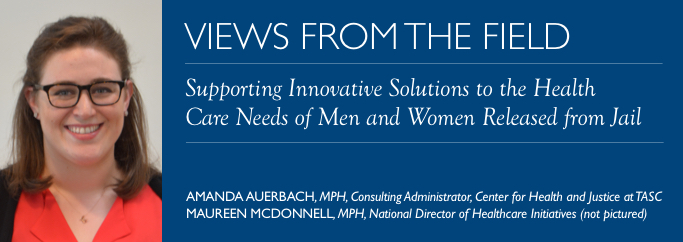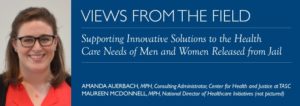
There were nearly 11 million admissions to United States’ jails in 2015 (Minton et al 2016). Research shows that men and women admitted to jail have disproportionately higher rates of chronic illness than the general population, along with higher rates of early death (Maruschak et al 2015; Lim et al 2012).
Lifetime Prevalence of Chronic Conditions and Infectious Diseases Among Jail Inmates and the General Population, 2011-12*
| Chronic Illness | Jail Pop. | General Pop. |
| Hypertension | 26% | 14% |
| HIV | 1.3% | 0.3% |
| Hepatitis B or C | 6.5% | 0.9% |
| Asthma | 20% | 11% |
| Substance Use Disorder | 68% | 9% |
| Mental Illness | 64% | 10% |
*Adapted from Table 2, Maruschak, et al, 2015
These individuals often have urgent health care needs during the transitional period immediately following release from jail. However; because most jail stays are relatively short and many jails lack sufficient resources, individuals leaving jail often do not receive discharge planning services that promote continuity of care between facility-based and community-based mental health or substance use services, leading to deleterious health and justice outcomes for the individual. This is a concern because, in addition to needing chronic disease management, many individuals released from jail are at an increased risk of dying from drug overdose, suicide, or homicide, especially during the two weeks immediately following release, when, studies estimate, they are five to eight times more likely to die than those in the general population (Lim et al 2012). Additionally, individuals with these conditions and illnesses may be particularly vulnerable to unsafe conditions if released at night without anyone to pick them up. Coordinated discharge and supportive reentry efforts can improve the safety and health of individuals leaving jails, especially those with these chronic conditions.
Supportive Release Center in Chicago
To address these challenges in Chicago, Illinois, a broad group of funders, government health and criminal justice agencies, and nonprofit organizations are working to develop a substantial infrastructure to provide continuity of care for individuals leaving the Cook County Jail.
The Supportive Release Center (SRC) is the newest component of this infrastructure development. A collaborative initiative by TASC, the Sheriff’s Office for Cook County, University of Chicago Urban Labs, and Heartland Health Outreach, the SRC offers transitional resources for men leaving Cook County Jail who have substance use, mental health, and/or physical health disorders and who do not have an immediate place to go.
The SRC has been made possible through investment by a group of local funders. Recognizing an urgent need in the community, The Chicago Community Trust provided early funding for a planning process to develop interventions for individuals leaving Cook County Jail. Michael Reese Health Trust funded jail release planning and the creation of a jail discharge center, which provides linkages to services to individuals who are being processed out of the jail. With support from the Polk Bros. Foundation, TASC facilitated a provider innovation collaborative to build a comprehensive system of community-based care providers serving individuals leaving the jail.
These projects both underlined the need for and laid the groundwork necessary to create the SRC. Through its Innovation Challenge, the University of Chicago Urban Labs provided planning and start-up funding to design and open the SRC. It continues to receive generous support from a variety of partners, including the Siragusa Family Foundation and many others.
An individual’s first night out of jail, particularly for those with behavioral and physical health issues, is a critical time for service engagement. The SRC engages individuals immediately at the time of their release from Cook County Jail. Located near the jail, the SRC offers an overnight stay where individuals can sleep, shower, receive clothing, and do other planning to meet basic survival needs. While individuals are at the SRC—overnight to the following morning—TASC care coordinators work with them to assess and begin to address their health care needs, including connections to primary care, medications, mental health and substance use treatment, and other services as needed. The intention of this intervention is to help stabilize individuals in the community, improve their health, and lessen their likelihood of returning to jail.
The SRC opened in June 2017. During its first month in service, the SRC assisted more than 30 men, providing them with an overnight stay, while addressing their health care needs and providing linkages to other community service providers. TASC, which administers the SRC, offers engagement services at the jail, transportation, and care coordination services. Heartland Health Outreach provides on-site medical services as well as ongoing, intensive case management services for a subset of participants. To evaluate the SRC’s effectiveness, UChicago’s Health Lab will conduct a two-year randomized control trial that will measure the SRC’s impact.
The early and ongoing investment by local foundations and partners has been vital in its creation, and, following formal evaluation, results and lessons will be shared widely. In the meantime, funders across the country who are interested in health and justice work are encouraged to engage with local community and justice leaders, service providers, and nonprofit organizations to uncover existing infrastructure and identify areas of need and opportunities. By inviting partners to collaborate, funders can foster dialogue and lay the groundwork to spur innovative, effective solutions to urgent problems.
References
James, Doris J. & Glaze, Lauren E. Mental Health Problems of Prison and Jail Inmates. U.S. Department of Justice, September 2006.
Karberg, Jennifer C. & James, Doris J. Substance Dependence, Abuse, and Treatment of Jail Inmates, 2002. U.S. Department of Justice, July 2005.
Lim, Sungwoo, Seligson, Amber L., Parvez, Farah M., Luther, Charles W., Mavinkurve, Maushumi P., Binswanger, Ingrid A., and Kerker, Bonnie D. Risks of drug-related death, suicide, and homicide during the immediate post-release period among people released from New York City jails, 2001-2005. American Journal of Epidemiology, February 2012.
Marcuschak, Laura M., Berzofsky, Marcus, & Unangst, Jennifer. Medical Problems of State and Federal Prisoners and Jail Inmates, 2011-12. U.S. Department of Justice, February 2015.
Minton, Todd D. & Zeng, Zhen. Jail Inmates in 2015. U.S. Department of Justice, December 2016.

